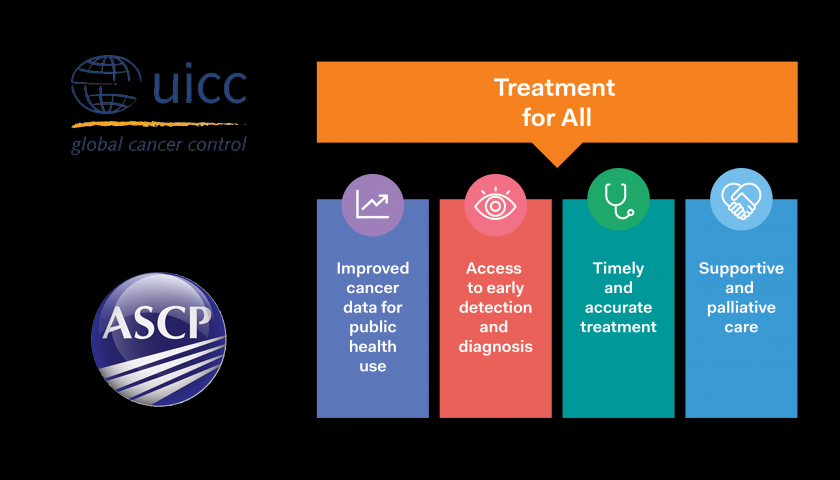ASCP Joins UICC’s World Cancer Day Initiative to Raise Awareness of Unequal Access to Cancer Detection, Treatment and Care Services
On World Cancer Day, cancer leaders call for equal access to reduce premature cancer deaths by 25%
- World Cancer Day 2018 highlights the global equity gap in accessing early detection, treatment and care services
- UICC calls for more equal access to reduce premature cancer and non-communicable disease deaths by 25% by 2025 in line with WHO targets
- Consolidated country-by-country statistics on cancer incidences and mortalities, national cancer control plans and registries and access to radiotherapy based on latest GLOBOCAN and WHO data
World Cancer Day: On Sunday, Feb. 4, World Cancer Day raises awareness of the millions of people world-wide facing unequal access to cancer detection, treatment, and care services. With cancer leaders, health professionals and supporters across the world pushing for urgent action to reduce the rate of premature cancer deaths globally, the day calls for diagnostic and treatment access to be prioritized.
The global target of a 25% reduction in premature deaths from cancer and non-communicable diseases* (NCDs) by 2025 is possible. However, to deliver on this global commitment†, the current inequities in risk factor exposure, and in access to screening, early detection and timely and appropriate treatment and care, must be addressed.
Professor Sanchia Aranda, President of UICC and CEO of Cancer Council Australia: “Set in 2011, the World Health Organization’s target to cut premature NCD deaths by 25% within 14 years is coming towards its half way mark. We can meet the target, but more action than ever will be required. Inequality in access to prevention, diagnosis, treatment and care makes reducing premature deaths from cancer difficult. If we are committed to achieving this goal, we must act quickly and decisively to make access to cancer services more equal all around the world.”
Dan A. Milner, Jr., MD, MSc(Epi), FASCP, Chief Medical Officer, the American Society for Clinical Pathology (ASCP):
“ASCP is pleased to join with the UICC on World Cancer Day to raise awareness of the importance of improving access to quality cancer diagnostics and treatment as part of the UICC’s ‘We Can. I can.’ campaign.”
World Cancer Day, led by the Union for International Cancer Control (UICC), every year rallies the world’s voices against what the World Health Organization (WHO) recently recognized for the first time as the leading cause of global morbidity.
Today, there are an estimated 8.8 million deaths from cancer every year . However, it is the low- to middle-income countries who are bearing the brunt, as approximately 70% of deaths occur in developing countries, which are the most ill-equipped to cope with the cancer burden .
Inequities are also acutely experienced in high- to middle-income countries, particularly within certain populations, including the indigenous, immigrant, refugee, rural, and lower-socioeconomic populations.
Professor Sanchia Aranda: “In the last year of the ‘We can. I can.’ campaign for World Cancer Day, we hope to inspire real action from governments and civil society in addressing the inequities in cancer diagnosis, treatment and care, which unfortunately largely affects the most vulnerable populations in every country.”
For example, approximately 650,000 people in Africa develop cancer annually, and about 510,000 cancer deaths occur annually due to limited treatment and resources. (There is one pathologist per approximately 1 million people in Sub-Saharan Africa.) ASCP, through its Partners for Cancer Diagnosis and Treatment in Africa initiative, is establishing telepathology laboratories in multiple resource-limited areas, including Rwanda, Tanzania, Uganda, and Haiti to provide patients with access to rapid cancer diagnostics and appropriate care and treatment.
Meanwhile, ASCP is also working with Novartis and the American Cancer Society (ACS) to devise a common approach to improve access to cancer treatment in several countries in Sub-Saharan Africa. ASCP is building healthcare capacity for immunohistochemistry (IHC) analysis in seven hospital laboratories in Ethiopia, Rwanda, Uganda, and Tanzania. ACS is supporting the training of healthcare professionals in Ethiopia, Tanzania and Uganda to ensure quality processes in the transportation of biopsy samples and in the administration of chemotherapy. Novartis will provide funding to support the technical work. This initiative will serve as a pilot for the future roll-out of similar activities to other countries.
As an urgent response to the global equity gap and the critical need for an in-country response, UICC today officially launched, Treatment for All. It marks the second new initiative by UICC in as many years to mobilize national action to improve access to diagnosis and treatment for cancer, and is a direct acknowledgement that the cancer burden cannot be alleviated exclusively through prevention to reduce cancer incidence. ASCP supports the Treatment for All initiative as its concept is a central pillar of the ASCP Partners project.
Dr. Cary Adams, Chief Executive Officer of UICC: “The tsunami of cancer cases anticipated in the coming decades requires a persuasive and robust response at all levels – global and national. Treatment for All, in tandem with its sister initiative, C/Can 2025: City Cancer Challenge, will work to accelerate progress by translating global commitments to evidence-, safety- and quality-based national actions.” ASCP is the lead medical laboratory organization for the C/Can 2025: City Cancer Challenge.
By empowering individuals, cities, countries and governments to lever Treatment for All’s four pillars of cancer treatment and care, we can achieve:
- Improved quality of cancer data for public health use
- Increased number of people with access to early detection and accurate cancer diagnosis
- Greater timely and quality treatment for early and metastatic disease
- At a minimum, basic supportive and palliative care service for the current 32.6 million people living with cancer .
Today, on World Cancer Day, ‘We can. I can.’ improve access and deliver on the global target of a 25% reduction in cancer and NCD premature deaths by 2025.
*Non-communicable – or chronic – diseases are diseases of long duration and generally slow progression. The four main types are cardiovascular diseases, cancer, chronic respiratory diseases and diabetes.
†The global community has committed to reduce premature deaths from cancer and NCDs by 25% by 2025 as set out in the Global Action Plan for the Prevention and Control of Non-communicable Diseases
‡The major modalities of treatment for cancer includes radiotherapy, surgery and medicines including chemotherapy
§The wide disparity in cancer services and patient outcomes depending on where you live is often called the Postcode Lottery

